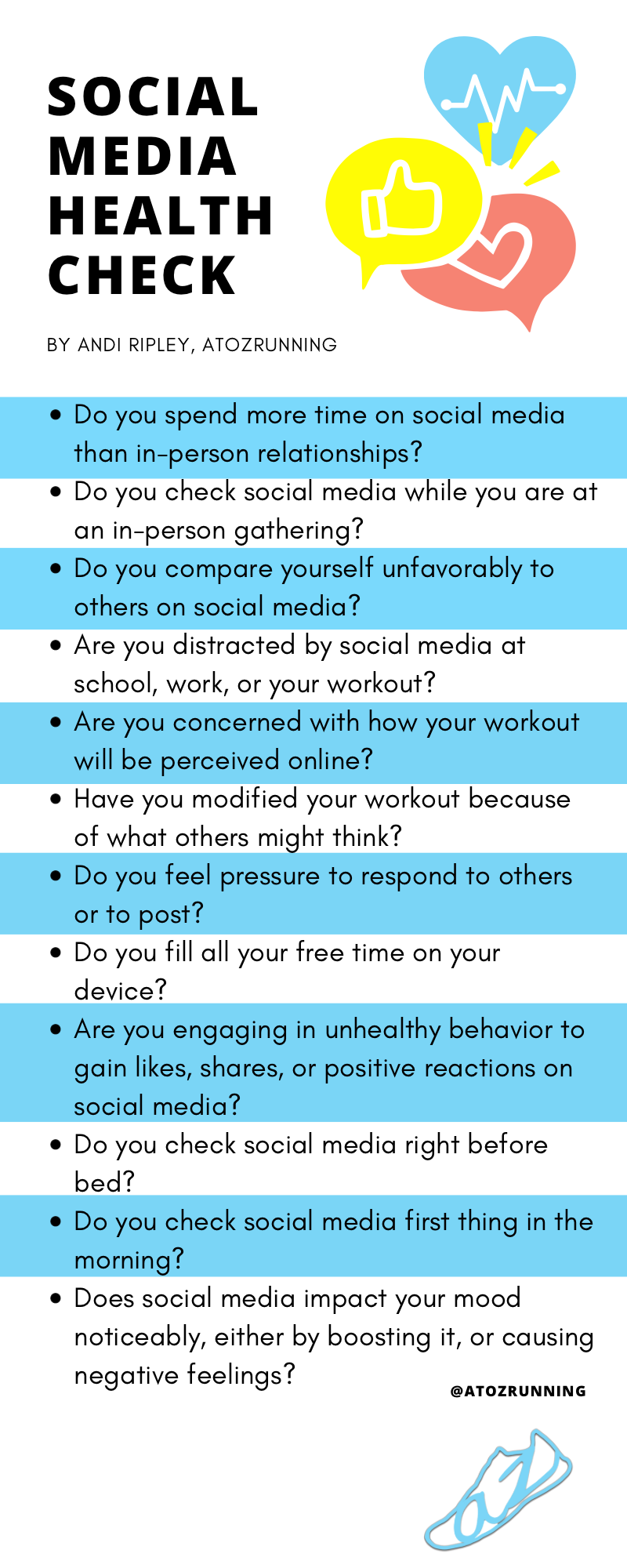by Andi Ripley, co-founder of AtoZrunning and Running Coach
Is social media good or bad for runners in training? The answer is both. In this article we use research to discuss the benefits and the dangers of social media use for runners.
Our take: If social media use is left unchecked, the negative impacts will cause a net-negative influence. If social media use is used in moderation and with clear positive intentions, you can enjoy the benefits of social media.
Social Media’s Prevalence and Power
On a variety of platforms, people around the globe have found connection to others with shared passions and interests. We must learn the prevalence and power social media has.
With more than 2.5 billion users (Computers in Human Behavior, 2020), social media is prevalent in a variety of different communities, including the running community. There are also social media platforms for training in the community. Strava has an estimated 76 million users as of January 2022. FitBit had 31 million as of 2020, and no information could be found for the number of Garmin Connect users. (businessofapps.com, 2022).
The power of social media is undeniable. Ideas, connections, media, and reactions can happen instantaneously. With the pervasiveness of social media, studies have been done to understand the effect on the brain. Social media has been suggested as potentially more addictive than cigarettes or alcohol (Royal Society for Public Health & Young Health Movement, 2017). Runners are not immune to addictive tendencies, and it has been speculated that runners tend to be more addictive.
The power of social media influence isn’t isolated to addiction tendencies, but can affect other areas of mental and physical health, which we will reveal in this article.
Related article: Screen Addiction Solutions
How does Social Media Affect Physical Health?
While the focus of most research about social media affects mental health, we cannot forget the impact of social media on our physical health.
Sleep is a crucial need for all humans, but especially runners in training. Proper sleep helps increase power, endurance, proprioception, and cognitive function. Poor sleep hygiene has been associated with higher perceived effort, decreased muscle glycogen concentration, reduced submaximal strength, time to exhaustion among other physical effects. Cognitive effects included decreased psychomotor functions, mood, and vigor. (Int J Sports Med. 2019).
So now that we know that sleep is critical for runners, how does social media affect our sleep? Research shows that nighttime use of social media engagement is causing poor sleep hygiene. The term used among the research we reviewed was FoMO (Fear of missing out). (Computers in Human Behavior, 2020) Notifications, messaging, new content, and all the instant gratification social media is designed to entice us with has contributed to FoMO and CSMU (Compulsive social media use). For many working adults and students, scrolling has interfered with bedtime.
While there isn’t specific research on the physical effects of social media use on running, we can look at cell phone usage and its effect on the body. Studies have found that subjects who used smartphones for prolonged durations tended more rounded shoulders compared with the subjects who spent less time on smartphones. People who used smartphones for prolonged durations had partly impaired respiratory function. (J Phys Ther Sci. 2016). Posture and respiratory function are imperative contributors for the function of running and decreasing their effectiveness will impact runners.
How does social media affect mental health in runners?
Stimulates of the brain, such as social media have an effect on mental health. Due to the underlying intention of social media’s design to draw us in and foster psychological cravings, it can very easily cause or make worse mental health issues.
According to HelpGuide (a resource for mental health), social media has become a “security blanket” for individuals. Compulsively turning to social media to avoid real life interaction or situations does not help people to deal with their issues, but only postpone and often worsen the problem.
Using social media to cope can also stunt our ability to manage our moods. While we may receive some instant gratification at first, HelpGuide writes, “Using social media more often, though, increases FOMO and feelings of inadequacy, dissatisfaction, and isolation. In turn, these feelings negatively affect your mood and worsen symptoms of depression, anxiety, and stress. These worsening symptoms cause you to use social media even more, and so the downward spiral continues.” Unmanaged, a state of negative mental health will continue within the context of social media addictions.
AtoZrunning did a small survey which revealed that many athletes admit that they compare their training to others on activity-based social platforms. These comparisons motivated some, while others acknowledge that the comparison made them feel insecure about themselves and their training. Remember as people post and share that research on impression management reveals that we work to manage the impressions we create. People will excuse, justify, exaggerate, or apologize as necessary in order to protect self-esteem and verify self-concepts (Tice & Baumeister, 1990) .
Confidence is crucial to performance. One study concluded that an individual’s personal standards were the most useful form of information with downward social comparisons. Higher self esteem was associated with better athletic performance. (Current Research in Social Psychology, 2002). Unavoidably, social media presents with social comparisons.
Are there any benefits of social media use for runners?
There are many benefits of social media. The most obvious advantage is in connecting with and finding a running community. You can follow runners from all over the world and interact with 98% of those responding to our survey indicating they have been inspired in their own training through social media.
Social media connections may also know how to give support in tough times. From injuries to running success and defeat, the support the running community gives online can be meaningful.
While there is a lot of poor information online, you can find a lot of good information too. 94% of respondents to our survey indicate that they learn from social media. Coaches (like us), physical therapists, Physiologists, professional athletes may help you in your training.
Social media is also an outlet for creativity and self-expression. There are benefits in articulating your training, what you’re learning, and experience. Social media can be a place to exercise this technique.
Do you have a healthy relationship with social media?
If social media use is an addictive behavior, we also must realize the implications it may have on our ability to discern our relationships with it. Denial is often the biggest obstacle in our way to healthier boundaries. Do you have a healthy relationship with social media? You can find out by honestly reflecting on the questions below:
You’re not alone if you said “yes” to any of the above social-media checks. Did you find areas to become aware of? Use this list to become mindful of your social media use and create better and healthier social media habits.
Can I use social media in a healthy way?
If you should engage with social media is entirely up to you. No one can answer that question for you. There are positive aspects to social media with a community of runners and friends to engage and inspire. The negative aspects require monitoring. We cannot let social media interfere with our real life and our training. We must exercise boundaries and control over our impulses and perceptions.
Consider your rest, mental, and physical health. Be present in your training and confident in your worth.
At AtoZrunning we create content to help you THRIVE. We are here with you and alongside you.
Instagram: @atozrunning
Facebook: @atozrunning
Twitter: @atozrunning
THRIVE AS A RUNNER
A to Z Running is a website, coaching, and podcast that gives information about the world of running, inspiration to fuel passion and excellence, and ideas for making connections and finding community.
If you want to THRIVE as a runner, subscribe for FREE. Add good things to your inbox to help you become a better runner.





Leave a Reply
Want to join the discussion?Feel free to contribute!